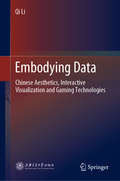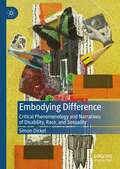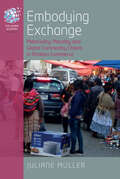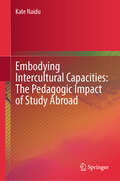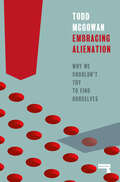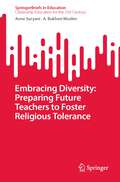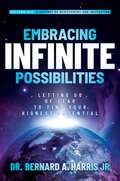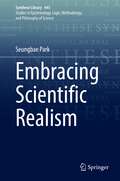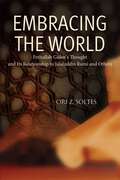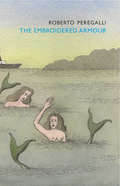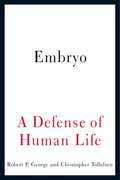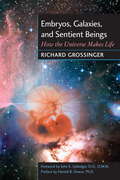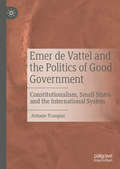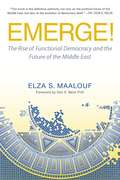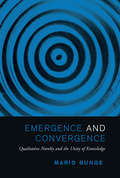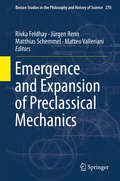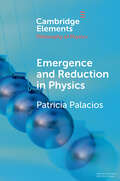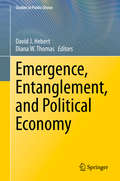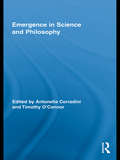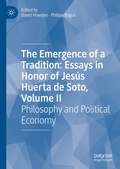- Table View
- List View
Embodying Data: Chinese Aesthetics, Interactive Visualization and Gaming Technologies
by Qi LiThis book investigates a new interactive data visualisation concept that employs traditional Chinese aesthetics as a basis for exploring contemporary digital technological contexts. It outlines the aesthetic approach, which draws on non-Western aesthetic concepts, specifically the Yijing and Taoist cosmological principles, and discusses the development of data-based digital practices within a theoretical framework that combines traditional Taoist ideas with the digital humanities. The book also offers a critique of the Western aesthetics underpinning data visualisation, in particular the Kantian sublime, which prioritises the experience of power over the natural world viewed at a distance. Taoist philosophy, in contrast, highlights the integration of the surface of the body and the surface of nature as a Taoist body, rather than promoting an opposition of mind and body. The book then explores the transformational potential between the human body and technology, particularly in creating an aesthetic approach spanning traditional Chinese aesthetics and gesture-based technology. Representing a valuable contribution to the digital humanities, the book helps readers understand data-based artistic practices, while also bringing the ideas of traditional Chinese aesthetics to Western audiences. In addition, it will be of interest to practitioners in the fields of digital art and data visualisation seeking new models.
Embodying Difference: Critical Phenomenology and Narratives of Disability, Race, and Sexuality
by Simon DickelThis book explores how phenomenological ideas about embodiment, perception, and lived experience are discussed within disability studies, critical race theory, and queer studies. Building on these disciplines, it offers readings of memoirs and novels that address the consequences of stigmatization and the bodily dimensions of social differences. The texts include Robert F. Murphy’s The Body Silent, Simi Linton’s My Body Politic, Rod Michalko’s The Two-in-One: Walking with Smokie, Walking with Blindness, three memoirs by Stephen Kuusisto, Vincent O. Carter’s The Bern Book, as well as two novels, Matthew Griffin’s Hide and Armistead Maupin’s Maybe the Moon. All of the texts discussed in this book negotiate the significance of bodily and perceptual habits, the influence of language and culture on embodiment, the importance of relationality and community, the severe effects of misrecognition, and the possibilities of emancipation and social recognition. Hence, they are read as pioneering contributions to the emerging field of critical phenomenology.
Embodying Exchange: Materiality, Morality and Global Commodity Chains in Andean Commerce (The Human Economy #11)
by Juliane MüllerAddressing the infrastructural, legal and moral complexities in contemporary world trade, this book uses an ethnographic analysis of the interface of multinational brand manufacturers and popular traders in the Bolivian Andes. It offers a situated account of traders’ understanding of regulatory principles, and traces commercial dynamics beyond the limits of what we define as economic. It aims to humanize our understanding of the economy by grounding it in everyday life and morality.
Embodying Intercultural Capacities: The Pedagogic Impact of Study Abroad
by Kate NaiduThis book examines the extent to which in-country education contributes to the development of intercultural capacities among students and investigates how this occurs. It examines the experiences of Australian university students participating in educational programs in Indonesia and critiques and extends notions of interculturality. The potential development of intercultural capacities is explored in relation to four key themes: pedagogy, temporality, home, and culture. The book demonstrates that interculturalisation is not an automatic or guaranteed result of simply being ‘immersed’ in-country, but rather involves an array of pedagogic processes (involving both human and non-human actors). It outlines the temporal dimensions of in-country education, examining the experience as part of a broader trajectory, involving significant moments, and a range of engagements with diverse temporal rhythms. The book concludes by exploring how students’ understandings of ‘culture’ and ‘cultural difference’ impact the way in which the study-abroad experience is navigated. Readers will gain a deepened understanding of how intercultural capacities develop, which can be applied to other educational contexts including schools, as well as corporate and not-for-profit settings. Those interested in sociology, particularly Bourdieusian analysis, will also benefit from this empirical application (and extension) of the notion of habitus in the context of student mobility. “This is a well conceptualized and beautifully written book that explores how study abroad programs can play an important role in equipping young people to navigate the super-diversity that has now become a critical feature of societies around the world. It shows how such programs have the potential to enhance intercultural capacities, especially when crafted in ways that are thoughtfully fashioned and carefully enacted.” — Fazal Rizvi, University of Melbourne Australia
Embracing Alienation: Why We Shouldnt Try to Find Ourselves
by Todd McgowanThe left views alienation as something to be resisted or overcome, but could it actually form the basis of our emancipation?In Embracing Alienation, Todd McGowan offers a completely different take on alienation, claiming that the effort to overcome it is not a radical response to the current state of things but a failure to see the constitutive power of alienation for all of us. Instead of trying to overcome alienation and accede to an unalienated existence, it argues, we should instead redeem alienation as an existential and political program.Engaging with Shakespeare&’s great tragedies, contemporary films such as Don&’t Worry Darling, and even what occurs on a public bus, as well as thinkers such as Descartes, Hegel, and Marx, McGowan provides a concrete elaboration of how alienation frees people from their situation. Relying on the tradition of dialectical thought and psychoanalytic theory, Embracing Alienation reveals a new way of conceiving how we measure progress — or even if progress should be the aim at all.
Embracing Diversity: Preparing Future Teachers to Foster Religious Tolerance (SpringerBriefs in Education)
by Anne Suryani A. Bukhori MuslimThis book presents a detailed discussion of Indonesian future teachers’ experience of religious diversity, tolerance and intolerance, their level of intellectual humility, and intentions to foster religious tolerance. Drawing from large-scale mixed methods research conducted in Indonesian universities involving over one thousand three hundred future teachers from diverse religious backgrounds, this book demonstrates that religion and religious beliefs can, and do, shape the way future teachers view their teaching practices and pedagogies. The book sheds light into the under-researched yet prominent issue of integrating tolerance into teacher education preparation. It is set in the largest Muslim-majority country in the world which, in recent years, has seen a gradual degradation of secularity while religion becomes more dominant across all levels and sectors of society. This novel and timely book is of interest to researchers, scholars, and students in religious studies, education, social sciences, and Asian studies, as well as anyone interested in the interplay between religion and education in the 21st century.
Embracing Hope: On Freedom, Responsibility & the Meaning of Life
by Viktor E. FranklA highly anticipated, rediscovered collection from Viktor Frankl, published for the first time in the United States, exploring freedom, responsibility, and how we can draw meaning from the temporary nature of our livesFrom the bestselling author of Man's Search for Meaning, which has sold over 18 million copiesThe Library of Congress lists Man&’s Search for Meaning as one of the ten most influential books in history. Scientists and artists, politicians and celebrities regularly cite Frankl as one of the most important authors every person should read. Now, there is another book for his devoted fans to add to their collections.Published here for the first time in the United States, Embracing Hope continues Frankl&’s enduring life&’s work and provides even more lessons for those searching for meaning and purpose. It&’s made up of four distinct pieces from Frankl on different themes - all uniting around the idea that we should remain open to life even when we have been subjected to appalling injustice, and even when we are faced with our own mortality and the brief nature of our lives. At a time of global suffering where so many are searching for hope and meaning, Frankl&’s work seems more relevant and more important than ever.Whether you're a devoted follower of Frankl's work or a newcomer seeking to enrich your understanding of life's purpose, this book promises a captivating journey that will leave you pondering its teachings long after you've turned the final page.Just imagine what would happen, what life would look like, if there were no death. Imagine what it would be like if you could postpone anything and everything, if you could put it off for eternity. You wouldn't have to do anything today or tomorrow. Everything could just as easily be done next week, next month, next year, in a decade, in 100 or 1,000 years. Only in the face of death, only under pressure from the finiteness, the temporal limitation of human existence, is there any point in going about our business, and not only in going about our business, but in experiencing life, and not only in experiencing life but also in loving someone, and even in enduring and surviving something that is inflicted on us.
Embracing Infinite Possibilities: Letting Go of Fear to Find Your Highest Potential
by Dr. Bernard A. Harris JrDr. Bernard Harris shares his journey, and an honest discussion of his struggles, ambitions, hopes and dreams, as a testimony to the voyage that we all face with a desire to discover the power from within.All of us have to deal with external challenges at some point in our lives. Liberation comes when you discover just how unimportant these things really are. Then you will no longer see the world around you as hostile and unforgiving. This reality will free you to be who you really are. There is great power with this realization! Self-endowed power that releases you from the burden of self-doubt. There is no greater power in the world, except that of God. This is, in fact, the truth that God wants for each of us. The realization of our own strength, that is, we are an integral part of something greater than ourselves. One of Harris&’s lifelong goals is to instill inspiration as well as aspiration in people. Embracing Infinite Possibilities looks to build on these ideas by serving as a roadmap to discover the power within each of us. If we are students of the universe, it is clear to me that each of us must find this power within to find our own way and in our own time—some through the experiences of life, some by reading, others by observing, being taught or through self-study. Harris encourages the reader to find their own path. As a companion to his first book, Dream Walker, Embracing Infinite Possibilities will open their mind to the infinite possibilities of life, instilling hope in those who have yet to discover their own power.
Embracing Prodigals: Overcoming Authoritative Religion by Embodying Jesus' Nurturing Grace
by John SandersDo you wonder why some people you know hold theological and political views that blow your mind but they find quite reasonable? Today, Christians are at odds over how to understand the Bible, atonement, and salvation of non-Christians. They are also polarized over issues such as same-gender marriage, income inequality, and health care. Two social science models, Nurturant and Authoritative, explain this divide. Values are at the heart of our disagreements. Nurturants prize empathy and cooperation while Authoritatives cherish obedience to law and order. Each group has distinct core values and these lead them to embrace different theological, moral, and political views. This book explains the divide and makes the case that Jesus embodied the Nurturant way of life. He modeled empathy, grace, forgiveness, and care for those beyond his own tribe. The Nurturant and Authoritative approaches have competed for thousands of years but contemporary research shows that the Nurturant way of life produces better mental and spiritual health as well as superior communities in which to live.
Embracing Scientific Realism (Synthese Library #445)
by Seungbae ParkThis book provides philosophers of science with new theoretical resources for making their own contributions to the scientific realism debate. Readers will encounter old and new arguments for and against scientific realism. They will also be given useful tips for how to provide influential formulations of scientific realism and antirealism. Finally, they will see how scientific realism relates to scientific progress, scientific understanding, mathematical realism, and scientific practice.
Embracing the Ordinary
by Michael FoleyNothing is less known than what seems familiar. The ordinary is always the exceptional in disguise. Everything happens when nothing is happening. It has always been difficult to appreciate everyday life, often devalued as dreary, banal and burdensome, and never more so than in a culture besotted with fantasy, celebrity and glamour. Yet many writers and artists have celebrated the ordinary, and many philosophers have offered insights into the rewards of paying attention to the here and now. With characteristic wit and earthiness, Michael Foley - author of bestseller The Age of Absurdity - draws on the work of 'champions of the ordinary', such as James Joyce and Marcel Proust, to encourage delight in the oddity of the everyday world. With astute observation and subversive glee, Foley brings fresh insights to such things as the banality of everyday speech, the complexity of everyday psychology, the ludicrousness of snobbery, love and sex, and the pleasures of the everyday environments of city, office and home. It is all more fascinating, comical and mysterious than you think. Praise for The Age of Absurdity 'Michael Foley's entertaining, intelligent book may just help you get over yourself. . . Absurdly readable' Observer 'Achingly funny and wise . . . vastly entertaining' Daily Mail
Embracing the World: Fethullah Gulen's Thought and Its Relationship with Jelaluddin Rumi and Others
by Ori Z. SoltesThis book is not a comprehensive study of Rumi and Gülen, but it seeks to explore the places where the thought of the one is echoed in the thinking of the other, either overtly or indirectly—and to note ways in which the opposite is true: that Gülen diverges from Rumi. The book is also seeking to suggest some of the larger contexts in which the thinking of both resides. Given the wide-ranging aspects of their respective writings, it should not be surprising if, minimally, we can find important foundation stones in both philosophy and theology in the edifices that they each construct.
The Embroidered Armour
by Shaun Whiteside Roberto PeregalliThe Embroidered Armour examines the Greek Mysteries, mythology and legends that heralded a revolution in thinking between the time of Homer and Plato, which gave birth to the Western cultural tradition.From the Trade Paperback edition.
Embryo
by Robert P. George Christopher TollefsenGeorge (jurisprudence and American ideals and institutions, Princeton U. ) is a member of the President's Council on Bioethics, so readers who think that august body is benefiting the world may be interested to learn about the murk its house is built on. He and Tollefsen (philosophy, U. of South Carolina) clearly have no competence to discuss the biology of human development or the theology of life and death. That is just fine, however, because their argument is all about politics and power. Annotati...
Embryogenesis
by Phoebe Gloeckner Richard Grossinger Jillian O'MalleyEmbryogenesis is an unusual book in that it brings together a highly illustrated, practical embryology book in simple language, perfect for health practitioners, with a fascinating read on the history and philosophy of biological science. It discusses the various stages of embryonic development (meiosis, fertilization, blastula development, and gastrulation, and then the embryology of each of the human organs and organ systems in detail). It puts each of them in context, both in terms of its phylogeny: the evolutionary trajectory of cell-organized systems on Earth, and its ontogeny: the formation of individual organisms in the modern world. There are 24 color plates, many of them commissioned uniquely for this volume, and several hundred black and white illustrations. The book is 950 pages hardcover, 8-1/2 by 10.Chapters include: The Original Earth; The Materials of Life; The First Beings; The Cell; The Genetic Code; Sperm and Egg; Fertilization; The Blastula; Gastrulation; Morphogenesis; Biological Fields; Chaos, Fractals, and Deep Structure; Ontogeny and Phylogeny; and Biotechnology. The Origin of the Nervous System; The Evolution of Intelligence; Neurulation and the Human Brain; Organogenesis; The Musculoskeletal and Hematopoietic Systems; Mind; The Origin of Sexuality and Gender. Healing; Transsexuality, Intersexuality, and the Cultural Basis of Gender; Self and Desire; Cosmogenesis and Mortality
Embryos, Galaxies, and Sentient Beings
by John E. Upledger Richard Grossinger Harold B. DowseWhy is the universe conscious? What kindles mind inside matter? Why do fundamentalist sciences and religions never ask these questions? This sequel to Embryogenesis deals with the theoretical issues brought up by Embryogenesis, including: the relationship between thermodynamics/entropy and the emergence of life; a speculative set of embryogenic principles for all creatures on all planets in the cosmos; an explanation and critique of Intelligent Design and a proposal for a more dynamic psychospiritual theory of creature development; a series of alternatives to genetic determinism; a discussion of the relationship between consciousness and matter; an interjection of 9/11 (which occurred during the writing of this book); and many other topics. Chapters include: What is Life?: Evolution, Thermodynamics, and Complexity; Is There a Plan?: Creationism, Cultural Relativism, and Paraphysics; Biogenesis and Cosmogenesis: Cells, Genes, and Planets; The Principles of Biological Design: Physical Forces in Nature; The Dynamics of the Biosphere: Deep Time and Space; The Limits of Genetic Determinism: Dimensionless Epigenetic Landscapes; Topokinesis: Physical Forces in Development; Tissue Motifs and Body Plans: Coordinating Form; The Primordial Field: Metabiology and The Molecular Apparatus; Meaning and Destiny: The Relation of Consciousness to Matter
Emer de Vattel and the Politics of Good Government: Constitutionalism, Small States and the International System
by Antonio TrampusThis book explores the history of the international order in the eighteenth and nineteenth century through a new study of Emer de Vattel’s Droit des gens (1758). Drawing on unpublished sources from European archives and libraries, the book offers an in-depth account of the reception of Vattel’s chief work. Vattel’s focus on the myth of good government became a strong argument for republicanism, the survival of small states, drafting constitutions and reform projects and fighting everyday battles for freedom in different geographical, linguistic and social contexts. The book complicates the picture of Vattel’s enduring success and usefulness, showing too how the work was published and translated to criticize and denounce the dangerousness of these ideas. In doing so, it opens up new avenues of research beyond histories of international law, political and economic thought.
Emerge!
by Elza S. MaaloufIn the Middle East, turmoil has spread quickly. Oppression, inequality, and violence have been keyed in to the very makeup of its society. But what causes a culture to emerge and prosper or stagnate and fail? How can the people take charge of their own inalienable rights to growth, freedom, and life - to keep from backsliding into the grasp of old, unhealthy ideologies and meet their need for ascendance? In Elza Maalouf's groundbreaking new book Emerge! The Rise of Functional Democracy in the Middle East, we are introduced to a new paradigm for governance based on Clare Graves' theory of Spiral Dynamics. Maalouf, the founder of the Center for Human Emergence and the Build Palestine Initiative, is an expert on the application of Spiral Dynamics in the Middle East. By placing democracy in an evolutionary, values-system context that is specific to unique, Middle Eastern characteristics, Emerge pioneers the foundations for necessary change. Where the West's approach to conflict resolution has failed due to lack of memetic understanding, Maalouf's framework for decoding the complexities of the Middle East succeeds. By weaving together the threads that make up the pattern of each culture, Emerge shows the crucial role memes play in creating a system of governance that truly fits. Not only does Emerge ask us to seek understanding before we structure and create, it shows us the necessity of teaching our youth to build their own sustainable, indigenous constructs.
Emergence and Convergence
by Mario BungeTwo problems continually arise in the sciences and humanities, according to Mario Bunge: parts and wholes and the origin of novelty. In "Emergence and Convergence," he works to address these problems, as well as that of systems and their emergent properties, as exemplified by the synthesis of molecules, the creation of ideas, and social inventions. Along the way, Bunge examines further topical problems, such as the search for the mechanisms underlying observable facts, the limitations of both individualism and holism, the reach of reduction, the abuses of Darwinism, the rational choice-hermeneutics feud, the modularity of the brain vs. the unity of the mind, the cluster of concepts around 'maybe, ' the uselessness of many-worlds metaphysics and semantics, the hazards posed by Bayesianism, the nature of partial truth, the obstacles to correct medical diagnosis, and the formal conditions for the emergence of a cross-discipline. Bunge is not interested in idle fantasies, but about many of the problems that occur in any discipline that studies reality or ways to control it. His work is about the merger of initially independent lines of inquiry, such as developmental evolutionary biology, cognitive neuroscience, and socio-economics. Bunge proposes a clear definition of the concept of emergence to replace that of supervenience and clarifies the notions of system, real possibility, inverse problem, interdiscipline, and partial truth that occur in all fields.
Emergence and Expansion of Pre-Classical Mechanics (Boston Studies in the Philosophy and History of Science #270)
by Jürgen Renn Matthias Schemmel Matteo Valleriani Rivka FeldhayThis book is divided into two sections. The first section is concerned with the emergence and expansion of a form of mechanical knowledge defined by us as pre-classical mechanics. The definition purports to the period roughly between the 15th and the 17th century, before classical mechanics was formulated as a coherent and comprehensive mechanical theory in the sequel of Newton's work. The investigation of problems that were isolated from each other at the time but cohered into some kind of stable broad intellectual framework characterizes pre-classical mechanics. The second section is dedicated to specific case studies that present the application of a pre-classical framework to determined problems and to the investigation of specific natural phenomena. It consists of five case studies that illustrate in detail a reconstruction of pre-classical mechanics in particular constellations. Early modern theoretical, technical and social contexts transformed ancient and medieval mechanical knowledge in the course of its transmission.
Emergence and Modularity in Life Sciences
by Lars H. Wegner Ulrich LüttgeThis book focuses on modules and emergence with self-organization in the life sciences. As Aristotle observed so long ago, the whole is more than the sum of its parts. However, contemporary science is dominated by reductionist concepts and tends to neglect the non-reproducible features of complex systems, which emerge from the interaction of the smaller units they are composed of. The book is divided into three major parts; the essays in part A highlight the conceptual basis of emergence, linking it to the philosophy of science, systems biology and sustainability. This is subsequently exemplified in part B by applying the concept of emergence to various biological disciplines, such as genetics, developmental biology, neurobiology, plant physiology and ecology. New aspects of emergence come into play when biology meets the technical sciences, as revealed in a chapter on bionics. In turn, part C adopts a broader view, revealing how the organization of life follows a hierarchical order in terms of scalar dimensions, ranging from the molecular level to the entire biosphere. The idea that life is primarily and exclusively shaped by processes at the molecular level (and, in particular, by the information encoded in the genome) is refuted; rather, there is no hierarchy with respect to the level of causation in the cross-talk between the levels. In the last two chapters, the evolutionary trend toward ever-increasing complexity in living systems is interpreted in terms of the Gaia hypothesis sensu Lovelock: the entire biosphere is viewed as a functional unit (or ‘holobiont-like system’) organized to develop and sustain life on Earth.
Emergence and Reduction in Physics (Elements in the Philosophy of Physics)
by Patricia PalaciosThis Element offers an overview of some of the most important debates in philosophy and physics around the topics of emergence and reduction and proposes a compatibilist view of emergence and reduction. In particular, it suggests that specific notions of emergence, which the author calls 'few-many emergence' and 'coarse-grained emergence', are compatible with 'intertheoretic reduction'. Some further issues that will be addressed concern the comparison between parts-whole emergence and few-many emergence, the emergence of effective (-field) theories, the use of infinite limits, the notion of intertheoretic reduction and the explanation of universal and cooperative behavior. Although the focus will be principally on classical phase transitions and other examples from condensed matter physics, the main aim is to draw some general conclusions on the topics of emergence and reduction that can help us understand a variety of case-studies ranging from high-energy physics to astrophysics.
Emergence, Entanglement, and Political Economy (Studies in Public Choice #38)
by David J. Hebert Diana W. ThomasThis volume is intended to serve as a review of the “next generation” of political economy scholars in what can be called the “Wagnerian” tradition, which traces its roots to Buchanan and De Viti De Marco in the 1930s, who argued that any decision that results from a political entity must be the product of individual decision makers operating within some framework of formal and informal rules. To treat these decisions as if they were the product of one single mind, or even simply the additive result of several decisions, is to fundamentally misunderstand and mischaracterize the dynamics of collective action. Today, Richard Wagner is among the most prominent theorists in analyzing the institutional foundations of the economy and the organization of political decision-making. In this collection of original essays, former students schooled in this tradition offer emerging insights on public choice theory, public finance, and political economy, across a range of topics from voting behavior to entrepreneurship.
Emergence in Science and Philosophy (Routledge Studies In The Philosophy Of Science Ser. #6)
by Antonella CorradiniThe concept of emergence has seen a significant resurgence in philosophy and the sciences, yet debates regarding emergentist and reductionist visions of the natural world continue to be hampered by imprecision or ambiguity. Emergent phenomena are said to arise out of and be sustained by more basic phenomena, while at the same time exerting a "top-down" control upon those very sustaining processes. To some critics, this has the air of magic, as it seems to suggest a kind of circular causality. Other critics deem the concept of emergence to be objectionably anti-naturalistic. Objections such as these have led many thinkers to construe emergent phenomena instead as coarse-grained patterns in the world that, while calling for distinctive concepts, do not "disrupt" the ordinary dynamics of the finer-grained (more fundamental) levels. Yet, reconciling emergence with a (presumed) pervasive causal continuity at the fundamental level can seem to deflate emergence of its initially profound significance. This basic problematic is mirrored by similar controversy over how best to characterize the opposite systematizing impulse, most commonly given an equally evocative but vague term, "reductionism." The original essays in this volume help to clarify the alternatives: inadequacies in some older formulations and arguments are exposed and new lines of argument on behalf the two visions are advanced.
The Emergence of a Tradition: Philosophy and Political Economy
by David Howden Philipp BagusThis book, the second of two volumes, explores the impact of Jesús Huerta de Soto and his role in the modern revival of the Austrian School of Economics. Through chapters discussing philosophy and political economy, the nature of capitalism and the foundations of economics are examined in relation to Austrian economics. These ideas and the work of Huerta de Soto are also contextualized within the broader history of economic thought to provide insight into their influence and development.This book highlights and builds upon the intellectual legacy of Jesús Huerta de Soto through its contribution to the Austrian School of Economics. It will be relevant to students and researchers interested in Austrian economics, philosophy, and political economy.
